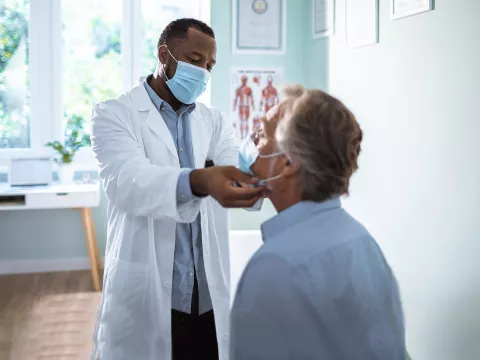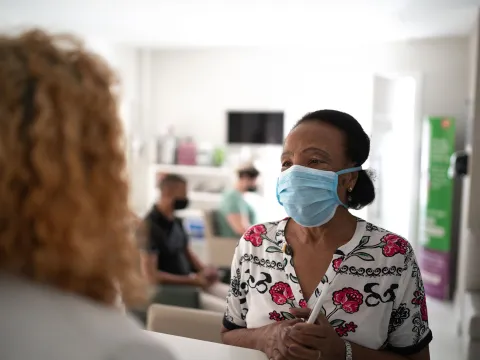- AdventHealth

Everyone runs for tums from time to time with some reflux after eating a large meal, but when you start to feel that uncomfortable, burning feeling a few times per week or with more concerning symptoms, there’s a more serious suspect: GERD.
GERD, or gastroesophageal reflux disease, affects an estimated 20 percent of the U.S. population. “GERD is very common and it differs from the occasional feeling of “heartburn” in that it causes troublesome symptoms and/or complications. It’s important to seek evaluation from a physician because it can be treated, which can help prevent more serious digestive problems down the road,” says Nicole Gomez Dorati, MD, gastroenterologist at AdventHealth.
She adds, “GERD can affect anyone at any age, even children; however obesity, smoking, hiatal hernia, anxiety and even depression can increase one’s risk.”
Understanding GERD
GERD occurs when your stomach’s contents back up into the esophagus, the muscular tube that carries food from your mouth to your stomach. When the lower esophageal sphincter – the muscular ring that separates the esophagus from your stomach – becomes weak and relaxes when it shouldn’t, symptoms of GERD may surface.
“While this may happen occasionally for some, for others GERD is a chronic condition that requires consistent lifestyle modifications and medication,” says Dr. Gomez.
Symptoms of GERD
Dr. Gomez explains that common symptoms of GERD include heartburn (burning sensation behind the breastbone), regurgitation (where acid and or food comes up from the stomach into the mouth) and epigastric pain. Other not so common symptoms are chest pain, nausea, difficulty swallowing, painful swallowing.
“One or two of these symptoms on occasion is not alarming, but if you are experiencing these symptoms two or more times a week (especially difficulty or painful swallowing, bleeding or significant weight loss) and/or you’re over age 50 it’s important to let your doctor know right away,” advises Dr. Gomez.
GERD should be treated because too much stomach acid in the esophagus can result in inflammation, acid scarring and strictures that can cause the lower end of your esophagus to narrow, making it difficult to swallow. It also may lead to a condition called Barrett’s esophagus, where the cells of the tissue lining the esophagus changes abnormally and can lead to cancer.
“It’s important to know that just because you have GERD doesn’t mean that you’ll get esophageal cancer — there are higher risk groups including males, Caucasians, obese individuals and chronic smokers,” says Dr. Gomez.
Diagnosing and Treating GERD
“GERD is one of the most common diagnosis in my office, so it’s very common,” Dr. Gomez explains.
If the patient is age 50 and older and has “alarm symptoms” such as difficulty swallowing, pain when swallowing, weight loss, vomiting of blood or blood in the stools, it’s important to do more testing to ensure the symptoms are not related to something more serious, like a malignancy. However, most patients can begin lifestyle modifications and medications to treat GERD right away.
“Lifestyle, especially your diet and body weight, can make a big impact in improving your GERD symptoms. If a patient does not have alarming symptoms and their symptoms are not so troublesome I often recommend trying lifestyle modifications first, before medications,” notes Dr. Gomez.
Some of these lifestyle modifications that can help reduce the symptoms of GERD include weight loss, elevating the head while sleeping, avoiding heavy meals two to three hours before bedtime, and avoiding high-fat foods, chocolate, peppermint, carbonated drinks and caffeine. If you have GERD, making these changes for life go a long way to help manage symptoms and improve quality of life.
When it comes to medical management of GERD, Dr. Gomez says that there are very effective, well-studied medications available.
Medications in GERD Treatment
“The medications have the highest efficacy in the treatment of GERD are proton pump inhibitors, or PPIs. They are the first line of medical treatment for GERD,” explains Dr. Gomez.
PPIs treat the symptoms of heartburn caused by gastroesophageal reflux disease (GERD) by blocking the stomach’s ability to produce too much acid. And these medications are often quite successful.
Dr. Gomez adds, “40 to 90 percent of patients with GERD respond to PPI treatment; this is a very high response rate and we see many patients improve with these medications taken appropriately.”
This includes taking the PPI consistently every morning 30 minutes before eating anything.
“For many of my patients, we talk about lifestyle modifications and start a PPI for eight weeks. Then, we evaluate how successful they were. Most patients improve, but if a patient does not, we talk about compliance with the lifestyle changes and medication timing, and determine if further testing is needed to evaluate for esophageal disease,” Dr. Gomez explains.
Dispelling PPI Medication Myths
“It’s really important for people to understand that many of the studies that have tried to correlate PPI use with serious adverse effects like Alzheimer’s Disease or heart attack were observational studies and not randomized controlled studies that provide the most accurate data,” Dr. Gomez clarifies.
That said, Dr. Gomez emphasizes that any chronic medication can expose some level of risk, from minor side effects to potentially less common serious problems. With PPIs some of these associated risks include vitamin absorption or bone fractures.
“I see each patient as an individual and reassess the need for chronic medication over time. If a patient has been on the medication and wants to stop it, we can revaluate. It might be possible to stop the medication with a very compliant lifestyle changes alone,” she adds.
Surgical GERD Treatment
For some, surgical treatment for GERD might be indicated over chronic medications.
“GERD can be a lifelong problem, so those who qualify for surgery may find it as an alternative to medical therapy,” says Dr. Gomez.
Many of these procedures are performed laparoscopically.
“Patients who qualify for bariatric surgery may additionally benefit from weight loss and a reduction in GERD symptoms,” Dr. Gomez adds.
Learn more about Dr. Gomez and get the help you need to treat GERD here.





